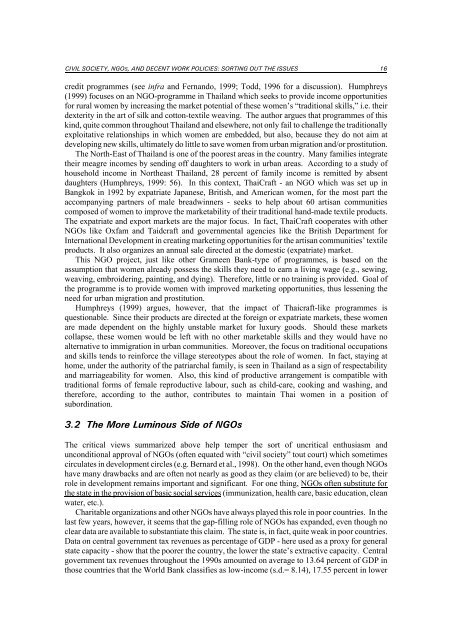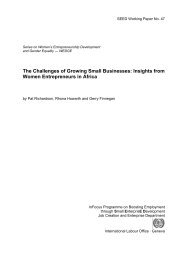Civil Society, NGOs, and Decent Work Policies: Sorting out the Issues
Civil Society, NGOs, and Decent Work Policies: Sorting out the Issues
Civil Society, NGOs, and Decent Work Policies: Sorting out the Issues
Create successful ePaper yourself
Turn your PDF publications into a flip-book with our unique Google optimized e-Paper software.
CIVIL SOCIETY, NGOS, AND DECENT WORK POLICIES: SORTING OUT THE ISSUES 16<br />
credit programmes (see infra <strong>and</strong> Fern<strong>and</strong>o, 1999; Todd, 1996 for a discussion). Humphreys<br />
(1999) focuses on an NGO-programme in Thail<strong>and</strong> which seeks to provide income opportunities<br />
for rural women by increasing <strong>the</strong> market potential of <strong>the</strong>se women’s “traditional skills,” i.e. <strong>the</strong>ir<br />
dexterity in <strong>the</strong> art of silk <strong>and</strong> cotton-textile weaving. The author argues that programmes of this<br />
kind, quite common through<strong>out</strong> Thail<strong>and</strong> <strong>and</strong> elsewhere, not only fail to challenge <strong>the</strong> traditionally<br />
exploitative relationships in which women are embedded, but also, because <strong>the</strong>y do not aim at<br />
developing new skills, ultimately do little to save women from urban migration <strong>and</strong>/or prostitution.<br />
The North-East of Thail<strong>and</strong> is one of <strong>the</strong> poorest areas in <strong>the</strong> country. Many families integrate<br />
<strong>the</strong>ir meagre incomes by sending off daughters to work in urban areas. According to a study of<br />
household income in Nor<strong>the</strong>ast Thail<strong>and</strong>, 28 percent of family income is remitted by absent<br />
daughters (Humphreys, 1999: 56). In this context, ThaiCraft - an NGO which was set up in<br />
Bangkok in 1992 by expatriate Japanese, British, <strong>and</strong> American women, for <strong>the</strong> most part <strong>the</strong><br />
accompanying partners of male breadwinners - seeks to help ab<strong>out</strong> 60 artisan communities<br />
composed of women to improve <strong>the</strong> marketability of <strong>the</strong>ir traditional h<strong>and</strong>-made textile products.<br />
The expatriate <strong>and</strong> export markets are <strong>the</strong> major focus. In fact, ThaiCraft cooperates with o<strong>the</strong>r<br />
<strong>NGOs</strong> like Oxfam <strong>and</strong> Taidcraft <strong>and</strong> governmental agencies like <strong>the</strong> British Department for<br />
International Development in creating marketing opportunities for <strong>the</strong> artisan communities’ textile<br />
products. It also organizes an annual sale directed at <strong>the</strong> domestic (expatriate) market.<br />
This NGO project, just like o<strong>the</strong>r Grameen Bank-type of programmes, is based on <strong>the</strong><br />
assumption that women already possess <strong>the</strong> skills <strong>the</strong>y need to earn a living wage (e.g., sewing,<br />
weaving, embroidering, painting, <strong>and</strong> dying). Therefore, little or no training is provided. Goal of<br />
<strong>the</strong> programme is to provide women with improved marketing opportunities, thus lessening <strong>the</strong><br />
need for urban migration <strong>and</strong> prostitution.<br />
Humphreys (1999) argues, however, that <strong>the</strong> impact of Thaicraft-like programmes is<br />
questionable. Since <strong>the</strong>ir products are directed at <strong>the</strong> foreign or expatriate markets, <strong>the</strong>se women<br />
are made dependent on <strong>the</strong> highly unstable market for luxury goods. Should <strong>the</strong>se markets<br />
collapse, <strong>the</strong>se women would be left with no o<strong>the</strong>r marketable skills <strong>and</strong> <strong>the</strong>y would have no<br />
alternative to immigration in urban communities. Moreover, <strong>the</strong> focus on traditional occupations<br />
<strong>and</strong> skills tends to reinforce <strong>the</strong> village stereotypes ab<strong>out</strong> <strong>the</strong> role of women. In fact, staying at<br />
home, under <strong>the</strong> authority of <strong>the</strong> patriarchal family, is seen in Thail<strong>and</strong> as a sign of respectability<br />
<strong>and</strong> marriageability for women. Also, this kind of productive arrangement is compatible with<br />
traditional forms of female reproductive labour, such as child-care, cooking <strong>and</strong> washing, <strong>and</strong><br />
<strong>the</strong>refore, according to <strong>the</strong> author, contributes to maintain Thai women in a position of<br />
subordination.<br />
3.2 The More Luminous Side of <strong>NGOs</strong><br />
The critical views summarized above help temper <strong>the</strong> sort of uncritical enthusiasm <strong>and</strong><br />
unconditional approval of <strong>NGOs</strong> (often equated with “civil society” t<strong>out</strong> court) which sometimes<br />
circulates in development circles (e.g. Bernard et al., 1998). On <strong>the</strong> o<strong>the</strong>r h<strong>and</strong>, even though <strong>NGOs</strong><br />
have many drawbacks <strong>and</strong> are often not nearly as good as <strong>the</strong>y claim (or are believed) to be, <strong>the</strong>ir<br />
role in development remains important <strong>and</strong> significant. For one thing, <strong>NGOs</strong> often substitute for<br />
<strong>the</strong> state in <strong>the</strong> provision of basic social services (immunization, health care, basic education, clean<br />
water, etc.).<br />
Charitable organizations <strong>and</strong> o<strong>the</strong>r <strong>NGOs</strong> have always played this role in poor countries. In <strong>the</strong><br />
last few years, however, it seems that <strong>the</strong> gap-filling role of <strong>NGOs</strong> has exp<strong>and</strong>ed, even though no<br />
clear data are available to substantiate this claim. The state is, in fact, quite weak in poor countries.<br />
Data on central government tax revenues as percentage of GDP - here used as a proxy for general<br />
state capacity - show that <strong>the</strong> poorer <strong>the</strong> country, <strong>the</strong> lower <strong>the</strong> state’s extractive capacity. Central<br />
government tax revenues through<strong>out</strong> <strong>the</strong> 1990s amounted on average to 13.64 percent of GDP in<br />
those countries that <strong>the</strong> World Bank classifies as low-income (s.d.= 8.14), 17.55 percent in lower
















